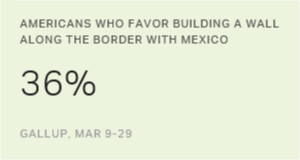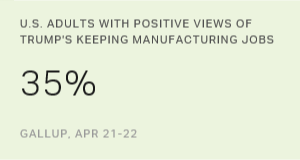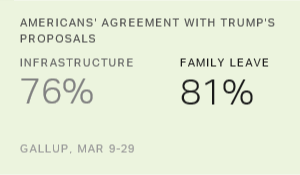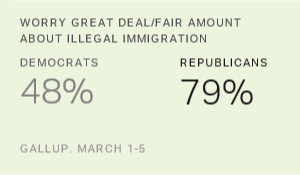President Donald Trump this week pulled back on his initial threats to make funding a wall along the nation's southern border a necessary part of Congress' legislation to prevent a government shutdown. But he promised that "the wall's going to get built, folks," saying that "we're already preparing. We're doing plans, we're doing specifications, we're doing a lot of work on the wall." His administration has in fact already put out for building parts of the wall, and some firms have already responded with their conceptual plans.
But the American people have little interest in a wall and rate it one of the least important things the president could do at this point. This leaves the president pushing for an objective out of sync with general American public opinion.
We most recently included the concept of building a wall in a list of 15 different actions that Trump could take or has already taken. The was "begin the construction of a wall between the U.S. and Mexico." The idea received 36% agreement and 56% disagreement, putting it dead last on the list based on net agreement.
In January, we asked about the importance of Trump keeping a list of campaign promises and included : "Build a wall along the border with Mexico." The results: 26% of Americans said that it was very important, putting it second to last on an even longer list, ahead of only requiring that for each new federal regulation, two be eliminated.
We asked about the wall last year with a different phrasing: "Use money from Mexican visas to pay for border wall with Mexico." The results showed that 31% agreed and 51% disagreed.
just a couple of weeks ago showed 33% support for "building a wall on the border with Mexico." A in January found 37% support for "… building a wall along the U.S.-Mexico border to try to stop illegal immigration." And in February found 35% support for "building a wall along the entire border with Mexico."
The finding that between 30% and 40% of the American population favors building a wall appears to be reliable and robust across question wordings.
This lack of interest in building a wall doesn't appear to be directly related to money. Most Americans, for example, spending $1 trillion on infrastructure. The issue may be that citizens directly benefit from better roads, highways, tunnels and bridges. Any benefit from the wall is more indirect.
Also, it's not the concept behind the wall that is in disfavor. Most Americans agree that keeping people from entering the country illegally is a good thing. As a rule, if it is illegal, Americans want it stopped.
Previous ���۴�ýresearch has shown that 77% of Americans say that "controlling U.S. borders to halt the flow of illegal immigrants into the U.S." is extremely or very important. And 83% favor "tightening security at U.S. borders."
It doesn't appear to be the conceptual objective of stopping illegal entry into this country that is in play but rather the mechanism used to operationalize that objective.
The Trump administration may now be edging closer to this understanding. Trump's Secretary of Homeland Security, John F. Kelly, has recently that it is unlikely that an actual physical wall along the almost 2,000 miles of border between Brownsville, Texas, and San Diego will be built. The concept of a "wall" is becoming, it appears, more symbolic, representing the goal of higher levels of border security in a general sense.
This shift of focus could help Trump get out of a bind. He prides himself on keeping his promises. If he morphs his promise into a "non-physical" wall, then he can both keep his promise and come closer to representing the majority in American public opinion.




